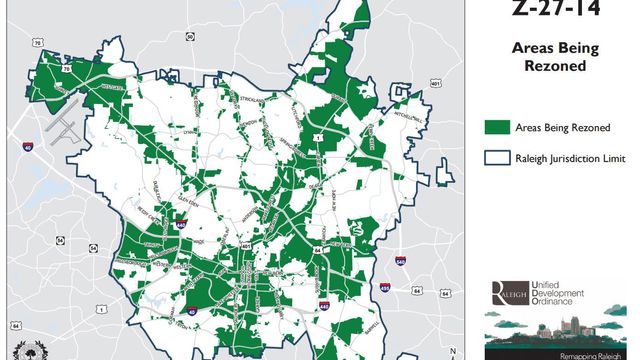Growth leads Raleigh to consider rezoning a third of the city
Increased development and population have led Raleigh officials to create a plan that will rezone about 30 percent of the city, most of which would affect homes and businesses in north Raleigh.
Posted — UpdatedCity officials estimate about 130 people signed up to speak.
Some of their opinions were not favorable.
"This rezoning is a betrayal," resident Michael O'Sullivan said.
The zoning changes would allow for more mixed use properties such as North Hills, which has apartments, restaurants and other businesses, said Raleigh Planning Director Ken Bowers, who described the city's current zoning map as "outdated." The proposed plan includes changing building height limits from being decided on a case-by-case basis to being pre-determined by district.
“I think they biggest change they'll notice is a continuation of some of the trends of seeing the city grow in a different way,” Bowers said. “So some of the development patterns we've seen in North hills and Cameron Village, which were difficult to zone for under the old code, will be much more easy to develop.”
Some north Raleigh residents have filed a petition against the plan. Those along Falls of Neuse Road successfully fought to keep a supermarket from being built.
"Why are we discussing rezoning that was already decided," said Bob Fry, who lives in the area.
The proposed plan includes turning four acres at Falls of Neuse and Dunn roads from a commercial buffer to mixed use.
"We are asking you to look at this in a fresh light because that is the way we are presenting it to you," Tom Worth Jr., an attorney representing the land owners, told city council members.
Residents in other parts of the city were also against the plan.
"Proposed to allow bars, nightclubs, restaurants serving alcohol and unlimited retail," said Matthew Brown, who lives in Historic Oakwood. "Yet this part of Oakwood is all historic houses."
Octavia Rainey, who lives in East College Park, said the plan would push long-time minority residents out of the area.
"We are under a serious threat," she said. "This new plan does not guarantee that black people are going to be living in historically black neighborhoods."
The next public hearing is on July 21, 6 p.m., inside City Council Chambers. About 60 people who didn't speak during Tuesday's meeting will be able to speak during the second hearing.
City council members have not decided when they will vote on the plan.
• Credits
Copyright 2024 by Capitol Broadcasting Company. All rights reserved. This material may not be published, broadcast, rewritten or redistributed.





